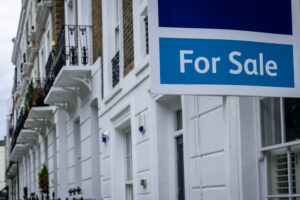
House sales continued to slow last month while the rental market picked up pace as prospective buyers put off purchases amid the surge in mortgage rates.
Inquiries among new buyers fell for a sixth consecutive month in October and the average time taken to complete a sale rose as buyers became wary about a looming recession, according to the latest survey from the Royal Institution of Chartered Surveyors.
The net balance for new buyer enquiries fell sharply to -55 per cent in October, down from -36 per cent the month before, suggesting that prospective buyers are increasingly cautious about purchases as financial conditions deteriorate.
House price growth, which hit record levels during the pandemic, has ground to a halt as people’s budgets are squeezed. The net balance for house prices stagnated in October after 28 consecutive months of growth. The index score fell to -2 per cent, down from 30 per cent in September.
The average time taken to complete a sale from the date of the initial listing rose to 18 weeks, up from 16 weeks in October last year.
However, rental prices continued to rise, with a net balance of 42 per cent of survey respondents reporting an increase in the past month. The number of new landlords fell, with a net balance of -14 per cent over the same period.
Demand was outpacing supply in the rental market, pushing up forecasts for rental prices, Simon Rubinsohn, the institution’s chief economist, said, adding that it was “difficult to see this changing any time soon in the current environment”.
The price of rental properties is expected to rise as the stock of homes available to let fails to keep up with demand. Chartered surveyors polled by the trade body expect rents to have risen by an average of 4 per cent across the country in a year’s time.
House buyers are facing a jump in the cost of borrowing after the Bank of England last week increased interest rates for the eighth time in a year, taking the base rate to its highest level since the global financial crisis at 3 per cent.
Central bank officials have warned that further rate rises are on the way amid fears that inflation, initially caused by a surge in global energy prices, has become “embedded” in the economy via higher wage demands and businesses’ plans to continue increasing the prices of goods and services. However, interest rates are not expected to rise as far as the 5.25 per cent priced into the money markets ahead of the Bank’s decision last week, ratesetters have said.
Since just before the pandemic, house prices have risen by more than 25 per cent, according to estimates published on Monday by Halifax, the mortgage lender. Even with the recent fallback, prices remain near a record high.
Average prices fell by 0.4 per cent to a five-month low of £292,598 after dipping by 0.1 per cent in September, according to the index, the sharpest fall in prices since February last year. The annual rate of growth dropped to 8.3 per cent from 9.8 per cent the previous month.
Rubinsohn said: “The latest feedback to the RICS survey provides further evidence of buyer caution in the face of the sharp rise in mortgage costs. As a result, the volume of activity is likely to slip back over the coming months and realistic pricing is now much more important to complete a sale. The settling down in financial markets could provide some relief, although it may be premature to assume this will be reflected in a reduction in lending rates any time soon.”
Tom Bill, at the Knight Frank estate agency chain, said house prices had peaked. “We expect prices to fall back to the level they were at in summer 2021 as rates normalise after 13 years,” he said.
Read more:
Rising mortgage rates force housing market slowdown




